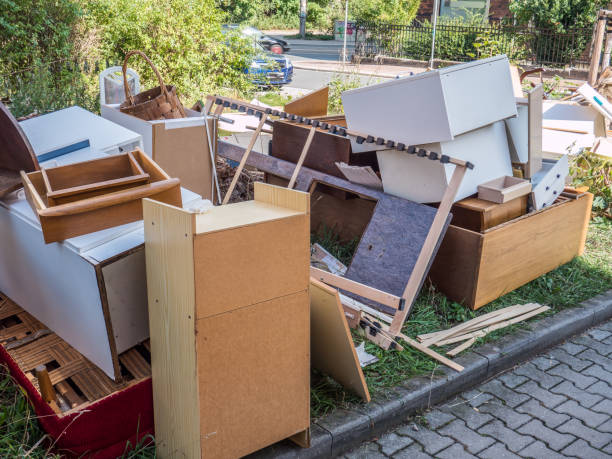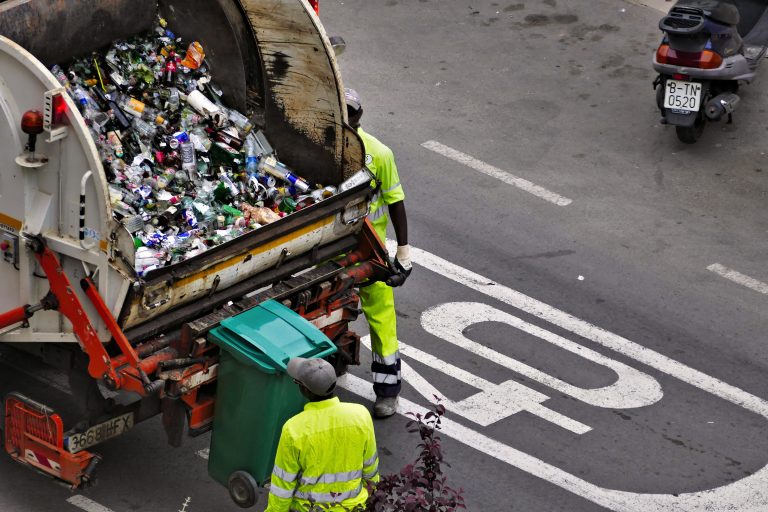Does The UK Still Use Landfill
The current state of landfills in the UK
This section dives into the impacts of landfill sites on the environment. landfill usage trends in the UK, focusing on the significant decline in recent years. We’ll explore how this shift reflects a move towards more sustainable waste management practices and analyze the implications of this change for the future, emphasizing the reduction of biodegradable waste sent to landfills.
The Decline in Landfill Use Over the Years
Landfill overflow is a pressing environmental concern, but there’s hope! Here’s a powerful combination of strategies driving us towards a more sustainable future:
- Regulation as a Catalyst: Stricter policies like landfill taxes and diversion targets are incentivizing businesses to embrace eco-friendly practices like recycling and composting. This translates to less waste ending up in landfills.
- Tech for Transformation: Innovation is key! Advancements like waste-to-energy plants and anaerobic digestion offer eco-friendly ways to process trash. These technologies not only minimize landfill burden but also generate valuable resources like renewable energy.
- A Multi-Pronged Approach: Building a lasting solution requires a multi-faceted approach, including stricter regulations for landfill operators to minimize waste sent to landfill. This includes: adopting practices that reduce municipal waste and promote biodegradable waste recycling.
- Boosting recycling initiatives: Making recycling accessible and efficient helps divert waste from landfills.
- Investing in waste management technologies: to reduce the amount of waste sent to landfill by increasing the capacity to process municipal waste more efficiently. Supporting research and development of innovative solutions is crucial.
- Spreading awareness: Educating individuals and businesses about responsible waste disposal empowers everyone to participate.
- Collective Action for a Sustainable Future: The responsibility lies with all of us – individuals, businesses, and policymakers. Every effort counts in minimizing landfill use. Let’s work together to protect our environment for generations to come. Take action today – explore recycling options in your area, support sustainable businesses, and advocate for responsible waste management policies.
Environmental impact of landfills in the UK
Landfills play a significant role in waste management, but their environmental impact can’t be ignored. Here, we delve into two key areas of concern for UK landfills: the escalating amounts of biodegradable municipal waste and the urgent need to divert more waste away from landfill sites.
- Pollution & Greenhouse Gas Emissions: Landfills contribute to air and soil contamination through processes like methane gas release and improper waste decomposition. These harmful emissions disrupt our climate and pose health risks.
- Soil & Water Contamination: Landfill leachate, a toxic liquid byproduct, can seep into the ground, polluting vital water resources and surrounding soil, a consequence often tied to improperly managed landfill operations and excessive biodegradable waste. This contamination poses a serious threat to ecosystems and public health.
By examining these detrimental effects, we can critically assess the sustainability of current landfill practices in the UK. This knowledge empowers us to advocate for more eco-friendly solutions and a greener future.
Pollution and greenhouse gas emissions
Landfills are a double-edged sword in waste management. While they provide a place for waste disposal, their environmental impact can’t be overlooked. Here’s a closer look at the pollution concerns surrounding UK landfills:
- Climate Change Culprits: identifying high volumes of biodegradable municipal waste sent to landfill as significant contributors. Landfills significantly contribute to global warming by emitting methane, a potent greenhouse gas. Additionally, volatile organic compounds (VOCs) released from landfills pose health risks to nearby communities.
- Groundwater Contamination: Improperly managed landfills allow leachate, a toxic cocktail of chemicals and contaminants, to seep into the ground, polluting vital groundwater resources.
- Living in the Shadow of Landfills: Dust particles, unpleasant odors, and emissions from waste transportation vehicles significantly impact air quality and quality of life for residents near landfills. This highlights the urgent need for stricter regulations on landfill operations.
A Beacon of Hope! The good news? Studies by ESAET (Environmental Services Association Education Trust) reveal a decline in methane emissions from UK landfills thanks to improved waste management practices. This positive trend emphasizes the power of sustainable waste management solutions in mitigating environmental harm.
Soil and water contamination
Landfills pose a significant threat to our environment, particularly regarding soil and water contamination. Here’s how:
- Toxic Brew: Organic waste decomposition releases harmful substances that can seep into the surrounding soil and contaminate nearby water bodies. Additionally, hazardous chemicals and heavy metals from certain waste types can persist in the environment, causing widespread ecological damage.
- Management Matters: Inadequate landfill management practices exacerbate the problem. Leaking landfill leachate, a toxic cocktail of contaminants, infiltrates the soil and reaches groundwater resources. This contaminated soil can negatively impact agricultural productivity and food safety.
- A Real-World Example: Residents near a landfill reported health issues within their community. Investigations revealed the local groundwater supply was polluted by the landfill, highlighting the real-world consequences of improper waste disposal.
A Call for Change: These concerns have prompted the UK government to take action. Efforts are underway to reduce landfill use and implement more sustainable waste management practices.
Government policies and initiatives to reduce landfill use
Landfill use in the UK is a pressing concern, prompting the government to implement a multi-pronged strategy for a more sustainable future. Here’s a breakdown of key initiatives:
- Landfill Tax Disincentive: The introduction of landfill taxes and levies discourages waste disposal in landfills, making it a less attractive option financially. This economic nudge encourages businesses and individuals to explore alternative waste management solutions.
- Recycling Revolution: Alongside economic measures, the UK government actively promotes recycling and waste diversion programs in an effort to lower the millions of tonnes of municipal waste sent to landfill each year. These initiatives educate the public and businesses on proper waste segregation, increasing the amount of recyclable materials diverted from landfills.
- Building a Sustainable Future: By combining economic disincentives with educational programs, the UK aims to tackle the environmental impact of landfills at its core. This comprehensive approach fosters a shift towards sustainable waste management practices, benefitting the environment for generations to come.
Introduction of landfill taxes and levies
Landfill taxes and levies are becoming a crucial weapon in the fight against overflowing landfills across the globe. The UK government, for example, has implemented these financial disincentives to make landfill disposal a less attractive option. Here’s why this strategy is proving effective:
- Encouraging Sustainable Choices: Landfill taxes create a financial incentive for individuals and businesses to explore alternative waste management solutions like recycling and composting. This shift in behavior reduces the overall amount of waste ending up in landfills.
- Investing in a Greener Future: The revenue generated from landfill taxes can be used to fund vital environmental initiatives. This includes supporting the development of greener waste management technologies and promoting public education about responsible waste disposal.
- Innovation Through Incentive: Landfill taxes also push companies to innovate. Businesses are increasingly seeking out eco-friendly solutions to minimize their waste disposal costs, fostering the development of new and sustainable waste management practices, including prioritizing the waste hierarchy to minimize waste sent to landfill.
A Global Call to Action: The success of landfill tax implementations like the UK’s model highlights their potential as a powerful tool in promoting sustainable waste management practices worldwide. Continued enforcement of these policies is essential to protect our environment and public health for future generations.
Citizen and Policymaker Partnership: By stressing the importance of landfill taxes and levies, we can inspire both policymakers and individuals to take action. Working together, we can significantly reduce landfill use and ensure a healthier, more sustainable future for our planet.
Promotion of recycling and waste diversion programs
Landfills are overflowing, and the UK government is taking action with a multi-pronged approach centered around recycling and waste diversion programs. These initiatives aim to foster sustainable practices and empower individuals and businesses to reduce waste generation.
Here’s how the UK tackles the problem:
- Streamlining Recycling: enhancing systems to decrease the million tonnes of municipal waste generated annually. Providing households with separate bins for recyclables like paper, plastic, and glass makes sorting waste easier and promotes wider participation in recycling programs.
- Business Incentives: Tax benefits and grants incentivize businesses to embrace recycling by offsetting program costs and making sustainable practices financially attractive.
- Educating for Change: Awareness is key! The UK government utilizes TV commercials, social media campaigns, and community workshops to educate citizens on proper recycling techniques.
- Safe Disposal of Hazardous Waste: Convenient drop-off locations for hazardous materials like batteries, electronics, and chemicals ensure responsible disposal and minimize risks associated with improper waste handling.
- Composting: converting organic and biodegradable waste into nutrient-rich compost, Solutions: Collaboration with agricultural organizations and community groups promotes composting programs. These initiatives educate residents on composting methods and provide access to compost bins, diverting organic waste from landfills.
Beyond Environmental Benefits: The ripple effects of recycling programs extend far beyond environmental benefits. These initiatives contribute to the creation of green jobs and foster the development of eco-friendly industries.
A Real-World Success Story: A local government workshop transformed a family-run restaurant’s approach to waste management. Inspired by the initiative, the owners implemented a comprehensive recycling program, targeting zero waste to landfill by segregating biodegradable and municipal waste for more efficient processing. including composting food scraps, using eco-friendly packaging, and streamlining their recycling procedures. The result? They not only minimized their waste output but also attracted environmentally conscious customers who valued their commitment to sustainability by significantly reducing the tonnes of waste sent to landfill.
The UK’s example demonstrates the effectiveness of government-led programs in promoting recycling and waste diversion. By implementing similar strategies, communities worldwide can significantly reduce landfill dependence and build a more sustainable future.
Alternatives to landfill in the UK
To tackle the issue of landfill usage in the UK, explore alternatives to minimize waste. Discover the benefits of waste-to-energy incineration, composting and anaerobic digestion, and material recovery facilities and recycling centers. Each solution provides an eco-friendly approach towards managing waste effectively.
Waste-to-energy incineration
Incineration can transform waste into energy, powering homes and businesses. Heat produced can be used in district heating systems. Advanced technologies keep emissions low and meet environmental regulations. Air pollution control systems filter out harmful substances.
Waste-to-energy incineration has great benefits, such as reducing waste in landfills, decreasing greenhouse gases, and producing renewable energy. We can make a positive impact on the environment by supporting this eco-friendly approach. Let’s join forces and safeguard our planet for future generations!
Composting and anaerobic digestion are key to getting trash in shape before it goes to the landfill.
Composting and anaerobic digestion
Table:
| Term | Definition |
|---|---|
| Composting | decomposition of organic waste into compost, turning biodegradable municipal waste into a valuable resource, |
| Anaerobic Digestion | breakdown of organic waste with bacteria, in the absence of oxygen |
| Outputs | nutrient-rich compost and biogas as energy source |
Aside from their waste management advantages, composting and anaerobic digestion aid in reducing greenhouse gas emissions. This approach to sustainability supports circular economy principles, as it transforms waste into resources.
An example: a rural English community implemented a composting system. People put their food scraps in designated bins. The waste underwent aerobic decomposition, producing quality compost which was then given to local farmers. This not only lessened landfill use but also supported regenerative farming, benefiting both the environment and the agricultural sector.
Why not bring your trash to a material recovery facility or recycling center – landfill’s worst fear!
Material recovery facilities and recycling centers
State-of-the-art machinery: These centers possess modern tech and machinery to separate recyclable materials.
Sorting and segregation: Waste is sorted into categories for individual processing.
Recycling processes: After sorting, materials are transformed into usable products or raw materials.
Promoting resource conservation: Material recovery facilities reduce the need for virgin resources, by recycling and minimizing landfill.
Job creation: The facilities create job opportunities in local communities.
National recycling targets: They help the UK achieve its recycling objectives by processing large volumes of waste.
Moreover, the centers act as educational platforms to teach people about recycling and waste management.
The emergence of material recovery facilities was due to environmental pollution caused by increasing disposal levels. Technology and regulations contributed to this development. Now they are part of the UK’s circular economy initiative and reducing reliance on landfills.
Let’s replace landfills with up-to-date alternatives and give them a proper burial!
Conclusion: The future of landfill use in the UK
The fate of landfills in the UK is unclear. As environmental worries grow, other waste management techniques are being considered. Recycling and burning are becoming more frequent, lessening the need for landfills.
Attempting to cut down landfill waste has caused recycling levels to rise countrywide. The government has created initiatives and rules to motivate recycling and discourage landfills. This has led to a sharp decline in the amount of waste being disposed of in landfills.
Using fire to get rid of waste is also becoming popular. Advanced technology is used to burn waste securely, producing energy in the process. This cuts down on landfill waste and also generates electricity for homes and businesses.
Besides recycling and burning, fresh strategies such as anaerobic digestion are being used. Organic waste materials are treated with bacteria without oxygen, generating biogas and nutrient-rich digestate. These materials can be used as renewable energy sources and fertilizers, respectively, decreasing the need for landfills for organic waste disposal.
An illustration of successful landfill reduction is seen in Newcastle-under-Lyme. There, a community project called “Waste Not” was rolled out. Locals were taught about recycling, resulting in a huge decrease in landfill waste. This success story shows the good effect that community involvement can have on landfill use.







